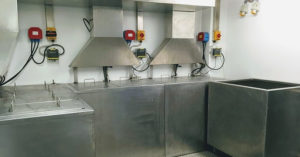
The Importance of In-House Degreasing and Passivation in Stainless Steel Manufacturing for the MedTech Industry
Stainless steel is the ideal material for the manufacture of a wide range of products, components, and equipment used or produced by the medical device and pharmaceutical manufacturing industries.
Examples include everything from cleanroom furniture to product contact vessels to material handling solutions for your production facilities.
Stainless steel is used in these applications because it is easy to clean. Crucially, it is also highly resistant to corrosion.
This corrosion resistance doesn’t always perform as well as intended, particularly when the manufacturing process damages this resistance and breaks down the passive layer
As a result, stainless-steel manufacturers must go through additional stages towards the end of the manufacturing process to restore the anti-corrosion capabilities of the stainless-steel products they produce.
Crucially, at Pharmaceutical Stainless Supplies, we complete these stages in-house. Using our own production facility considerably reduces the risk of contaminants and improves the quality of the products we produce.
We’re jumping ahead a bit, though. Let’s first explain further some of the points above.
The Corrosion Resistant Capabilities of Stainless Steel
Most grades of stainless steel have high levels of corrosion resistance because it has a chromium oxide layer on the surface of the steel. This is a passive layer as it makes the surface of the steel electrochemically passive when it is in a corrosive environment.
However, various stages of the manufacturing process breakdown this passive layer on the surface of stainless steel, exposing the steel to the risk of corrosion.
Mechanical processing (such as bending and manipulating the stainless steel) and the application of heat treatments, for example, break down the oxide layer on the steel that protects it from corrosion.
These manufacturing processes also result in the build-up of greasy and oily substances on the surface of the steel. These impurities increase the risk of corrosion too.
Furthermore, welding stainless steel also breaks down the closed oxide layer that prevents corrosion, as well as causing the stainless steel to become discoloured.
Restoring Corrosion Resistance
Two processes solve the above problems by restoring the appearance of the stainless steel as well as its corrosion resistance.
- Degreasing – the first of these processes is degreasing. It involves removing foreign substances present on the stainless steel as a result of the manufacturing process.
- Passivation – the second process is passivation. This process removes free iron from the surface of the steel to leave other substances, mostly chromium, as the surface layer. When exposed to air, the oxide layer of the stainless steel is reformed, giving it corrosion resistant capabilities again.
Common Degreasing and Passivation Practice
The degreasing and passivation processes of stainless-steel manufacturing are not unique to us at Pharmaceutical Stainless Supplies. In fact, all stainless-steel manufacturers who produce medical grade or food grade products should use these techniques to restore the anti-corrosion capabilities of stainless steel.
That said, common practice in the industry is to send stainless steel products to third-party degreasing and passivation facilities.
However, this adds risk as it exposes the unprotected stainless-steel to additional contamination.
After all, transporting stainless steel products to a third-party facility involves packaging, hand trucks, forklifts, lorries, and more. It also involves additional time as well as an extra quality control system from the third-party.
The result is often a product that has reduced levels of quality, durability, and performance.
The Importance of Having In-House Degreasing and Passivation Capabilities
The ideal situation is to use a stainless manufacturer that has degreasing and passivation processes in-house.
This keeps control over the entire manufacturing process with the main manufacturer. It also reduces the time between the end of manufacturing and the start of degreasing/passivation, and it limits the item’s exposure to transport and handling-related contaminants.
We have had in-house degreasing and passivation capabilities at Pharmaceutical Stainless Supplies for many years now. To find out more, please contact a member of our team.
Pharmaceutical Stainless Supplies is a leading manufacturer of bespoke stainless steel components, products, and equipment for the medical device and pharmaceutical manufacturing industries. Find out more by visiting the Pharmaceutical Stainless Steel website.
